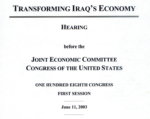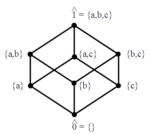This is my testimony to the Joint Economic Committee of Congress in 2003 making recommendations after the U.S. conquered Iraq and had to figure out what to do. Today, it can be read as a negative-blueprint since the U.S. seems to have done just the opposite on every count.
Reply to Commentators on Labor Theory of Property
My paper on marginal productivity theory and the labor theory of property in the on-line journal Economic Thought drew commentaries for Jamie Morgan and Ted Burczak. After some back and forth on the journal’s discussion forum, this Reply to Commentators paper was published as an article in the journal.
Autonomy-Respecting Assistance
This paper, written upon request for the UNDP volume on Capacity for Development and in time for a big conference in Mexico on the topic, is a good brief summary of my then forthcoming book, Helping People Help Themselves –even if I was screwed out of a sizable honorarium by one of the editors, Malik.
On Classical and Quantum Logical Entropy: The analysis of measurement
This paper shows how classical and quantum logical entropy arise out of the logic of partitions, and then it shows how there is a natural connection between the nxn distinctions and indistinctions of a partition and the nxn entries in a density matrix so that the classical and quantum logical entropy can directly register what happens to the density matrix in a projective measurement. The standard notion of von Neumann entropy does nothing of the kind–so the paper is also an indirect critique of von Neumann entropy as the most natural and ‘informative’ notion of entropy to use in quantum information theory.
Category theory and set theory as theories about complementary types of universals
This is a paper, published in Logic and Logical Philosophy, on the concept of universals in philosophical logic–which includes the example of “Sophia Loren as “the” Italian women”. The always-self-predicative universals of category theory form the opposite bookend to the never-self-predicative universals of iterative set theory.
Quantum Mechanics over Sets
This paper published in Synthese shows how the classical finite probability theory (with equiprobable outcomes) can be reinterpreted and recast as the quantum probability calculus of a pedagogical or “toy” model of quantum mechanics over sets (QM/sets).
Gian-Carlo Rota’s Probability Course: The Guidi Notes
This is a copy of the Guidi Notes for Gian-Carlo Rota’s Probability course at MIT the last time Rota gave the course. A copy of the Rota-Baclawski text used as course material can also be downloaded here.
Gian-Carlo Rota’s Combinatorial Theory Course: The Guidi Notes
This is a copy of the Guidi Notes for Gian-Carlo Rota’s famous Combinatorial Theory course at MIT taken the last time Rota taught the course.
Labor theory of property and Marginal productivity theory
This is a reprint from the journal Economic Thought of a paper on the labor theory of property and the neoclassial theory of marginal productivity.
Counting Direct-sum Decompositions
This paper uses elementary methods to derive the formulas for and to tablulate (in the case q = 2) two related q-analogs of the Stirling numbers of the second kind and the Bell numbers for direct-sum decompositions (vector space analogs of set partitions) of a finite vector space over a finite field with q elements.








